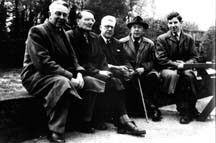Fans Or Community Or Personal Entourages
Recently I posted an open letter to readers of Christian fantasy over at Facebook. The article centers on what readers can do to promote the books they like with the ultimate goal to send a message to publishers to put out more.
A day or two later I posted a somewhat snarky comment about blog posts that promote their own work. Both have generated a bit of discussion.
Add in John Olson’s recent post here at Spec Faith about creating a community of Christian speculative writers and then Bruce Hennigan’s article Friday with Pete Peterson about Hutchmoot, and it seems we’re talking about relating to writers and their work — or not.
I had one friend tell me point blank he didn’t feel it was his job to promote others writing Christian fiction.
Maybe it’s not. Not his job or anybody else’s job other than authors and their own teams. But then I wonder, what does this idea of “community” mean?
For the Inklings that Bruce mentioned in his article, it meant frequent physical meetings, feedback about their writing, discussion of ideas, encouragement to become better. I’ve long thought how ideal that atmosphere must have been.
Hutchmoot sounds similar but different. It’s physical but not frequent. It’s much larger than the Inklings and doesn’t seem designed to offer feedback about individual projects.
Neither of them seems concerned with promotion.
![]() In contrast, John Olson’s ideas seemed centered on marketing. A group like the Christian Science Fiction and Fantasy Blog Tour (for the sake of full disclosure, I’m involved in the administration of CSFF), is set up primarily for promotion, though exchanging ideas has become more and more a key of successful tours.
In contrast, John Olson’s ideas seemed centered on marketing. A group like the Christian Science Fiction and Fantasy Blog Tour (for the sake of full disclosure, I’m involved in the administration of CSFF), is set up primarily for promotion, though exchanging ideas has become more and more a key of successful tours.
Add in fans — readers who love an author’s work, who engage one another in forums or post book reviews (generally of the five-star variety) on blogs and at Amazon. One person referred to these people as shills for the publisher. Often writers, editors, or agents have a group of fans that become regular visitors at their sites whose comments rarely diverge from a “you’re the best” theme.
I imagine that response is encouraging, but is gathering a fan base or an entourage what it means to develop a community?
How are we Christians to handle this side of writing? Are we to support — and promote — every other Christian speculative writer for no other reason than that they are Christian and are writing in the genre that we love?
Are we to ignore others and go about cultivating our own platform, our own fan base? Or is this call to community a Third Thing we should explore more?
And if the Third Thing is something we think is worth pursuing, will it isolate Christian speculative fiction in a niche where “us four and no more” will find what we want to read plus listening ears to our complaints against everyone else in the industry?
Here’s what I’m wondering: are we Christian speculative writers reading the work of other Christians? Are we telling anybody about the good books we find? Are we giving honest feedback in some forum or group or online site that encourages writers to improve?
Or is my friend right and it really isn’t my job to promote other Christian writers?
What do you think — is a greater community of Christian readers and writers interested in Speculative Fiction something desirable? And if so, what should it look like?
For additional thoughts on this subject, see “Writing Lone Wolves Or Inkling-like Writing Communities”










































Interesting enough, a friend of mine, Becky Minor, posted about something similar to this yesterday http://newauthors.wordpress.com/2011/07/10/the-power-of-the-reader/. Here is what I said in the comments:
Had another thought while reading the article you linked. My word of mouth (or blog or review) will reach readers that you do not have access too (and vice versa). Why? One, I live in Indiana and you do not. Right there, readers you may or may not have access to simply because you don’t live in the same area.
Secondly, profession. I am a pastor’s wife which gives me access to various congregations who want to hear what the pastor’s wife has to say (and sometimes they don’t like what I have to say ;p). A teacher will have access to readers that I don’t. Same with a doctor, a salesclerk or even someone who volunteers down at the local animal shelter.
Thirdly, networks/connections. I have access to some various networks that you may or may not. And I can use those connections to help promote your book. And you probably have networks I do not have access to.
So by working together, we could all help each with our own word of mouth/reviews/blogs and reach even more people with each others’ writing
I figure do unto others as they do unto me. I would love someday if my work is published (or if I self-published) that my friends would promote my work (as long as its good, of course ;). And I’m always willing to promote those books and authors I enjoyed. I put the disclaimer “enjoyed” because it is my word I am putting out there. I want my friends to believe that when I say I liked that book, I really did like that book 🙂
Great comment, Morgan. I appreciate you taking the time to post it over here, too. To me this promote for one another makes so much sense. It’s the idea of loving our neighbors. If I love myself, then one person is looking out for me. If I have three neighbors who love me, then I have three people looking out for me.
That’s the way Christians should promote, I believe. We can’t promote all books, but what if we promoted the ones we love to the three neighbors we love and asked them to promote them to their three neighbors? If the writing justifies our endorsement, it seems to me the word about the books will take off from there. If the writing does not justify the endorsement, then there’s not much we can do.
Becky
Thanks, Rebecca, for this post. It really raises a lot of issues. One comment I would make about Hutchmoot. It was focused on the concept of Story, regardless of genre or medium. Although I felt there was a greater emphasis on “speculative fiction” authors of the past such as Lewis, Tolkien, and MacDonald, the general idea I got from the meeting transcended not only individual genres within publishing, but transcended medium. For instance, the food was not just excellent, it was also themed to the conference and it was, in itself a work of art. It told a story! And, the chef was also a painter who created these extraordinary works of art that combined old, rejected objects with oil paintings. And, we had a musical concert by the Square Peg Alliance members. I guess Andrew Peterson represented the mixture that Hutchmoot exemplified because he is a best selling and powerful songwriter and singer and has also written three very excellent fantasy novels in the Wingfeather Saga.
Maybe this was lightning in a bottle and can’t be reproduced. Maybe all we can hope for is social media as our “community”.
On another note, I never thought about just supporting other speculative fiction authors just because of the genre. There is a really good point here, the delicate balance between promoting speculative fiction and not rewarding mediocre work. I’m not sure how to handle that.
I am moving ahead in my city on a Christian artist’s community meeting every other month. It will be very broad and I will see how that plays out. It may be a worthless endeavor. I doubt very seriously there are many speculative fiction writers in my area, so I’m interested in seeing how this turns out. Problem is, as you alluded to, I am doing this with the ultimate goal of promoting my own work. Disney calls is “synergy” but it is just self promotion. Is that bad? Should I not pursue such a thing just because it may ultimately benefit me? Good questions and I don’t have the answers. I’m looking forward to other comments to your post to see where this will take us.
I think writers need community, but desire promotion, and they often confuse the two. When the community delivers something less than breathless praise, or doesn’t rush out to buy the writer’s latest book, he/she feels betrayed. You hear things like, “That’s not loving,” or “Brothers and sisters in Christ shouldn’t criticize each other.”
As Becky noted, community provides encouragement with accountability, and the Inklings are a good example of how that can work in practice. It’s not a fan base or a platform of guaranteed sales. If Christian speculative fiction is to advance, we need to mature as a community that provides fellowship while demanding excellence.
Community. There is nothing wrong with an artist promoting their own work, but how much better when their friends and fans are also promoting their work? How much further the word can spread. How much more does such an artist feel supported and appreciated and with the knowledge that they don’t have to do this all on their own? Of course Christians should realize they are never truly alone with God, but how much better to know other humans believe in what you are doing too!
I don’t just read Christian works or only promote Christian authors, but I do endorse good stories told well that have a positive affect on me and my ways of thinking and being. I look to communities like this one, and the Rabbit Room for suggestions, as well as the opinions of friends.
I don’t agree with promoting anything because of the label- anyone can claim to be Christian and anyone who knows how to type could write a book. I want a good story told well. A story that takes me somewhere and gives me experiences of worlds and situations that make me think and feel and grow. If I can’t get past the awkward words on the page so that print fades into the background as the motion pictures of the story take the forefront then I will not be endorsing such a text. If the words of a book or even a song sound like something recycled or patched together… I want something fresh.
Why would a Christian ever isolate themselves, promote themselves, and try to make it on their own or for their own glory?
I hope to finish writing a book one day myself. I don’t look forward to standing on the promotion stage. That’s not me. But I hope that I promote for the right reasons. Not because I’m a great writer or I’m so special, but because the Great Author placed a story on my heart and I just had to tell it. Not for my glory, but His. Even if He is never mentioned directly- if a Christian writes excellently- takes minds to new places, makes them think and feel and grow- That is what should be promoted. New understandings and connections to God. And how can we promote that if we can’t even connect with each other?
If I hear you’ve written an excellent book that sounds like a story I would enjoy, I will put it on my “to read” list. If I love it then I will mention it and say good things about it wherever I can. I will join in your support community and hope that one day you might do the same for me.
Promote the good works of others just as you wish they would promote the works of yours that had a positive impact on their lives. No, it’s not your responsibility. Love doesn’t care who is responsible. Love reaches out helping hands because it is the right thing to do. Not because it is required, but because love for others and God compels us to be in community with each other and spreading around the goodness beyond what any human could do on their own. As we share we also receive. A flowing cycle of blessings round and round.
I definitely think we need to help promote each other, but we need to be careful not to slap 5-stars on every novel just because we want to see the genre grow. We need to be objective and honest in our criticism or the whole genre loses credibility.
I’ve read several Christian novels this year. I wish I had time to read more, but I’m not in that phase of life…
Do any of these aims need to be mutually exclusive of one another? Can we not as individuals AND as a community share our enthusiasm over the praiseworthy AND build our own marketing platforms AND help the genre develop more fans AND encourage authors who are both early and further along in their journeys of honing their craft?
Does there need to be any “OR”?
Edward, your questions suggest that there does not need to be an OR. I agree, but I don’t think that’s being widely practiced. It could be that the mentoring/accountability aspects that push writers to excellence are happening in small groups out of the public eye. Many acknowledgments pages seem to indicate this. However, I think there should be honest discussion once a book is out in the public arena, too. I don’t think we should be saying something is great that we don’t believe is great. At the same time, we don’t need to trash novels we think are wanting. But talking about a book is one of the best things that can happen, I think.
I also don’t think there’s a thing wrong with an author promoting his own work, to a point. For example, I didn’t mind putting the link at the end of the article letting readers know I have another article on this subject at my own blog. That’s promotion.
I think it would have been a mistake, however, for me to praise my own article or promote it as the final word on the subject or even say something along the lines of “everything you ever wanted to know about writing communities.”
How much better if someone else praises an author’s work rather than the author himself. How much better if that someone praises the work without having to be asked.
I guess that’s what I’m hoping to see more of. We who read Christian speculative fiction can serve writers by being vocal. Not every work deserves praise, but if we don’t at least let other readers know that Christian speculative fiction exists, readers will look for stories elsewhere.
And writers of Christian speculative fiction who don’t read it? Seems to me, reading each other’s books is a sign of respect and support. We can’t all read all the books that are out there. But it would be great if we made an effort to read a few.
Becky